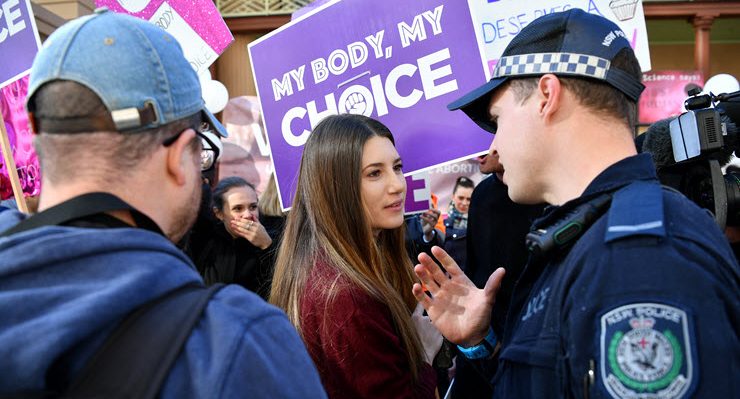
Here’s a guiding principle which has never failed me: in any public policy debate in which Tony Abbott and Barnaby Joyce participate, you can predict both the argument and its conclusion. And so it goes with abortion.
The abortion debate is a simple battle of conflicting moral beliefs: the absolute right of a human being to determine what happens to their body, versus the right of an unborn child to life. All human rights are contestable, but abortion generates so much particular heat due to its religious dimension; for the believers, compromise is out of the equation.
Every Australian state and territory has now decriminalised abortion except NSW. Now the NSW Parliament is moving to join the rest, but first we must endure the same rearguard defence from conservatives and churches as everyone else has.
The debate to date
It kicked off with the rare spectacle of the Reproductive Health Care Reform Bill 2019 being co-sponsored by 15 MPs from all parties. This was led by the independent Alex Greenwich and included the Health Minister Brad Hazzard. Everyone had been given a conscience vote.
The bill passed the lower house with a bunch of amendments on August 8 — 59 votes to 31. Premier Gladys Berejiklian was with the majority; most of her Coalition colleagues were not, and some haven’t been shy in accusing her of apostasy.
The upper house was poised to vote on August 21, with clear indications of a favourable majority, when Berejiklian caved to the objectors and pushed it back to mid-September. Why rush it? The no voters were apparently blindsided by the women’s rights movement which has been demanding this reform since before any of us was born.
Anyway, the delay at least provides an opportunity to look at what the new law will do. The current state of NSW law is that abortion remains a statutory crime. However, the courts progressively modified its application so that an abortion is lawful if a doctor honestly and reasonably believes it is necessary to preserve the patient from serious danger to their life or physical or mental health.
That pragmatic compromise hardly respects the rights of women and rests on an uncomfortable fiction. It is, therefore, bad law.
How to fix bad law
The bill will abolish the crime and make abortion explicitly a matter of medical care. Under the original draft, termination up to 22 weeks of pregnancy would be legal under all circumstances. After 22 weeks, it would require the agreement of two doctors that it should be performed, after considering the medical situation and the patient’s current and future physical, psychological and social circumstances.
Doctors who conscientiously object to abortion could refuse to perform it, but must refer the patient straight on to another doctor who is okay with it.
Numerous amendments were made in the lower house; all of them designed to make abortion less straightforward:
- for pre-22 week abortions, the patient must give “informed consent”, meaning freely and voluntarily;
- after 22 weeks, only “specialist” doctors can perform abortions, and it has to be done at an approved hospital or facility;
- for all abortions, the doctor must first assess whether the patient needs counselling and, if so, give them the necessary information about accessing it;
- doctors with a conscientious objection no longer have to refer the patient on to another doctor; instead they can just tell them where they might be able to find one.
Some of these changes are just silly — bureaucratic niggles chucked in to make the process more unpleasant and intrusive. Informed consent? Have people been getting abortions by accident? Would doctors otherwise be performing them without bothering to ask?
The “22 weeks” line is there because the viability of a live birth is generally realistic from around then. Why a pregnant person’s rights must take such a dramatic nosedive around then is not so obvious.
As for conscientious objection, no, the doctors of NSW haven’t been begging for extra protection for their delicate sensibilities. They have a much stronger grasp of their ethics than our politicians ever will.
The final ridiculousness was the insertion of provisions for “gender selection”. The bill now states the absolute obvious: “this House opposes terminations being performed for the sole purpose of gender selection”. The health minister is required to report back in a year on whether decriminalisation has triggered a wave of gender-based abortions — like it hasn’t anywhere, ever.
It was sexist paternalism and disrespect that made abortion a crime and has kept it thus for so long. It is this same instinct that seeks to delay and confuse the remediation of that wrong. But, whether because of or despite the Tony/Barnaby Effect, it will shortly lose this battle.








To oppose humane and accessible abortion rights for women, it seems to me, a privileged white bloke, unadulterated misogyny. These very same moralists will, at the drop of a hat by the US, send our troops anywhere in the world authorising them to terminate human life in pursuit of the mission. They support an asylum seeker policy designed to degrade and kill innocent people who have simply sought safety and opportunity.
But a woman deciding to terminate a mere foetus, that will cause the moral firmament to collapse. What fucking nonsense!
It’s all about power & control over women’s bodies & shows just how backward NSW is.
“The “22 weeks” line is there because the viability of a live birth is generally realistic from around then. Why a pregnant person’s rights must take such a dramatic nosedive around then is not so obvious.”
When should those rights take a nose-dive, if not then? Do you think the notion of rights is an obstacle to thinking about these kinds of issues?
Thanks Michael Bradley. Good analysis as usual.